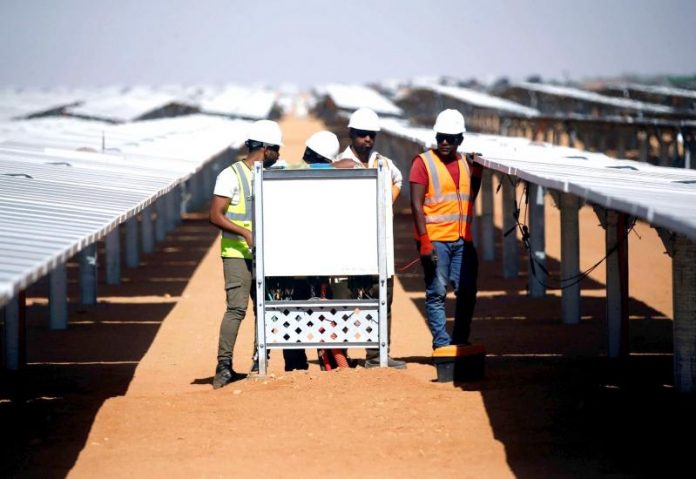CAIRO – Saudi and Emirati investments are helping create solar energy projects in Egypt after Egyptian authorities established a legal framework for private investments in renewable energy.
Saudi and Emirati companies reportedly plan to invest in three new projects with a capacity of 150 megawatts (MW) in addition to acquiring a 50-MW project belonging to the Italian company Enerray.
The Egyptian government enacted a law allowing state-owned Egyptian Electricity Transmission Company, affiliated to the Ministry of Electricity, to buy electricity produced by private companies under a new tariff. Experts said the price tier of 8.4 cents per kilowatt should attract investments.
The Benban Solar Park in southern Egypt is the first project designed to attract foreign investment in renewable energy. The facility includes 32 electricity production stations and has a capacity of about 1,465 MW and investments that exceed $2 billion.
The Benban project contributes about 1.5% of the total electricity generated in Egypt, while the Aswan High Dam contributes about 7% and 2% is from wind farms.
Solar energy expert Wael al-Nashar said investments in solar energy projects in Egypt by Saudi and Emirati companies should increase in line with Cairo’s plans to diversify its energy mix.
Nashar said Gulf companies have the required high financing capabilities, in addition to obtaining development loans from international institutions, including the European Bank for Reconstruction and Development and the International Finance Corporation.
The Islamic Trade Finance Corporation of the Islamic Development Bank set aside $1.1 billion in financing packages to invest in projects in Egypt, $700 million of which is earmarked for the energy sector with the rest meant to fund internal trade.
Renewable energy projects are considered as development projects and have priority in obtaining financing internationally.
International financing bodies require that companies producing electricity from solar energy obtain equipment designed and manufactured in accordance with strict international standards and norms.
While there are no factories in Egypt that meet that criteria — Egypt imports solar energy converters from Germany and solar panels from China — Saudi and Emirati companies, however, could import necessary components from internationally approved sources.
The investment boom in the renewable energy sector in Egypt encouraged the creation of business partnerships for the Egyptian market. The Egyptian company Infiniti created a joint venture with Emirati company Masdar to create Infiniti Power dedicated to renewable energy projects in Egypt as a first step with the idea of later expanding to other African markets.
By working with Infiniti, Masdar plans to expand in Egypt and provide financial backing for the new company to increase production from 234 MW to about 1,000 MW within five years.
Osama Junaidi, chairman of the Energy Committee of the Egyptian Association of Young Businessmen, said the development boom that Egypt is experiencing opens investment opportunities for Gulf companies.
Saudi company ACWA Power has established solar power plants in Egypt with a total capacity of 120 MW and has plans for a new power station in Luxor in southern Egypt. The company is implementing a $2.3 billion project in Dairut, also in southern Egypt, with a planned capacity of 2,250 MW. Production is expected to come online during the first quarter of 2021.
The Emirati solar power company Alcazar is seeking to expand activities in Egypt after it created four solar energy stations. The company is competing for two tenders for a solar farm and a wind farm in the West Nile region, in addition to its projects in the Benban Solar Park, with a production capacity of about 200 MW.
Alcazar, whose operations are supported by the Mubadala Investment Company of Abu Dhabi, has petitioned the Egyptian Ministry of Electricity for permission to build a 500-MW wind farm with investments of about $550 million.
Despite the surge in electricity production from solar energy in Egypt, the sector is still at its infancy. Cairo’s strategy calls for increasing electricity production from renewable sources to about 20% of the total electrical production capacity by 2022 and to about 42% by 2035.
The plan requires huge capital inflows in the next two years to double production, which currently represents about 10% of the country’s total electricity output of about 50,000 MW annually.
The challenge for Cairo lies in that it expects to reach, in two years’ time, a level of output equivalent to overall electricity output generated from renewable sources during the past six years.
Meeting that challenge requires drawing investors in the renewable energy sector to expand their activities, as well as continuing to purchase energy generated by private companies at current levels, even with the expected production increases stemming from the global boom in natural gas discoveries.
This expected boom will keep natural gas prices at stable and attractive low levels and render energy production from renewable sources competitive.






